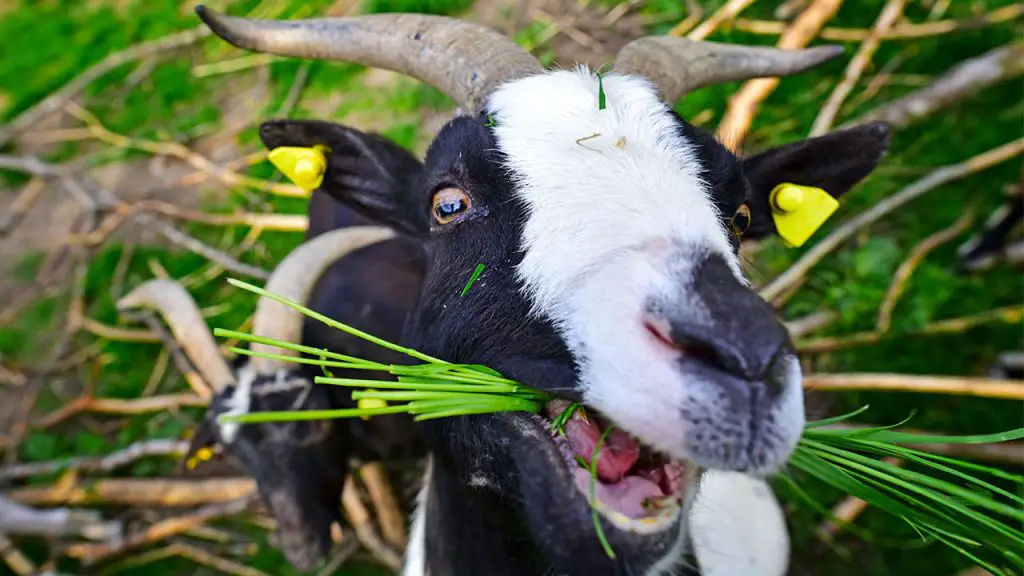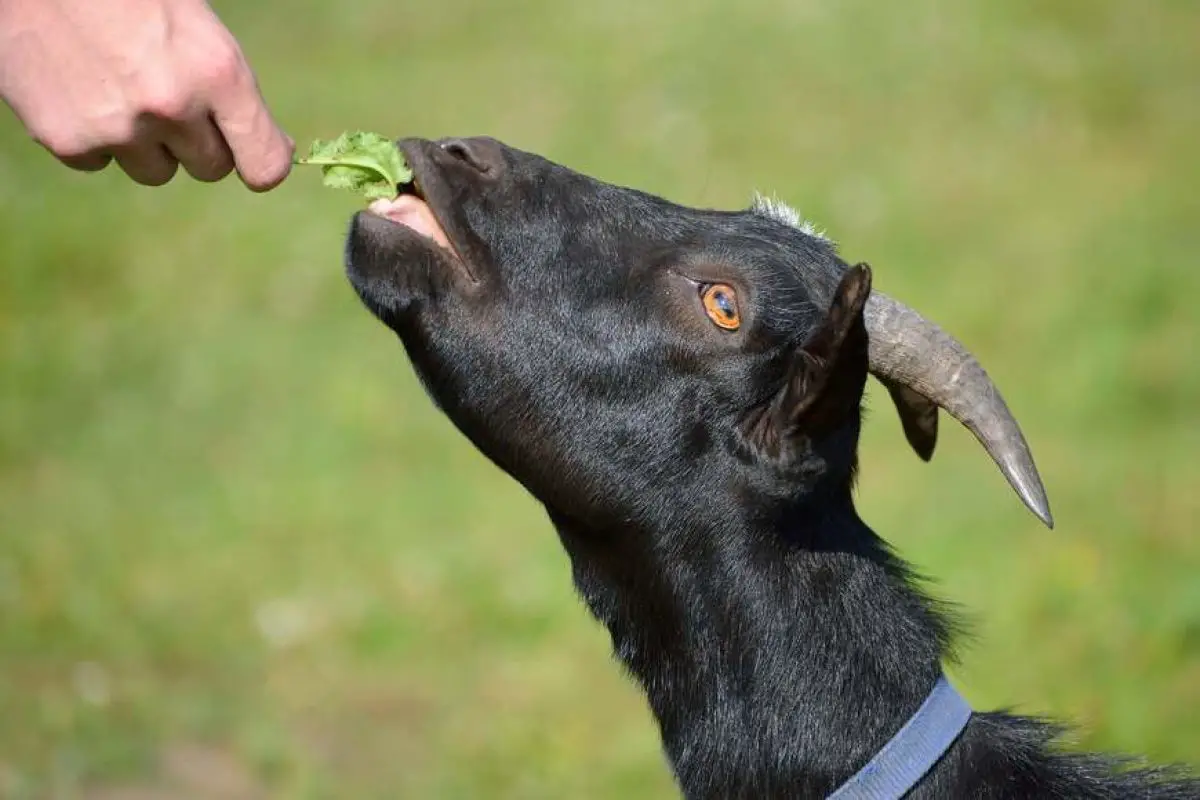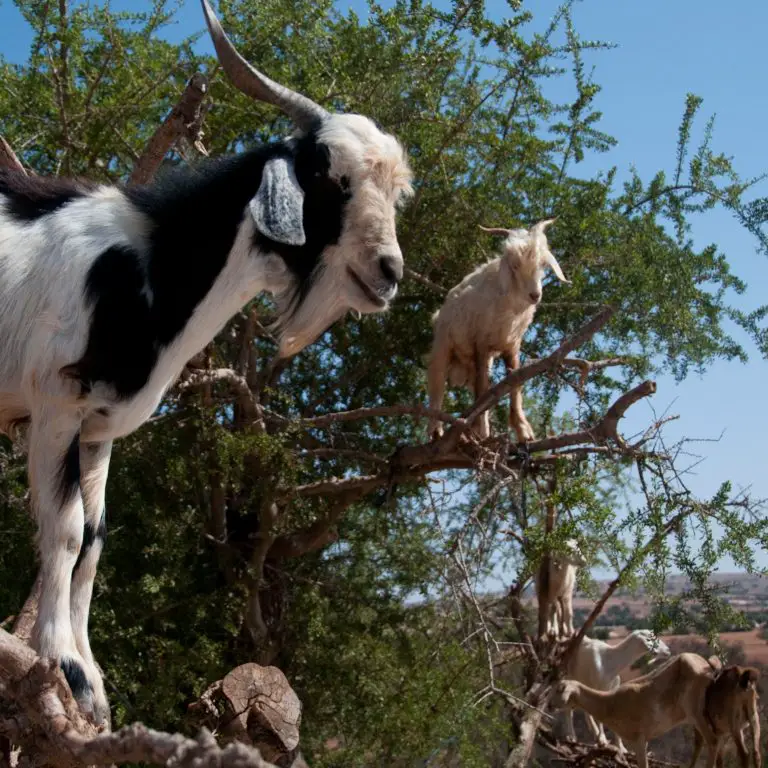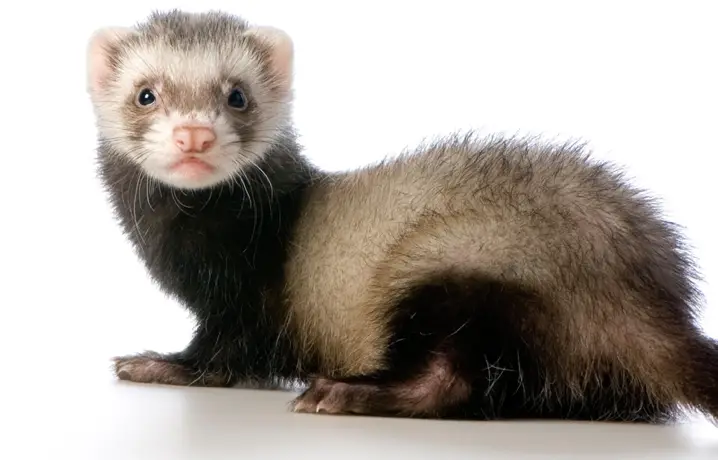What Can Goats Eat?
Goats can eat a variety of foods, including grass, hay, leaves, shrubs, and grains. They are versatile grazers that have a wide-ranging diet.
Goats are renowned for their ability to eat almost anything, from grass and hay to leaves, shrubs, and grains. Their diet is diverse and adaptable, allowing them to thrive in various environments. In this comprehensive goat diet directory, we will explore the different types of food goats can eat and provide a detailed understanding of their nutritional needs.
Whether you are a seasoned goat owner or considering getting goats for the first time, this guide will help you ensure that your goats are getting a balanced and healthy diet to support their well-being. So, let’s dive in and learn more about what goats can eat!
Core Constituents Of A Goat Diet
Goats have diverse dietary requirements, and their diet mainly consists of hay, grass, and other forages. Additionally, they can eat a variety of plants, leaves, shrubs, and tree bark, but certain foods like grains and food waste should be avoided.
A well-rounded goat diet ensures their nutritional needs are met and keeps them healthy.
When crafting a balanced goat diet, it is crucial to understand their nutritional needs. A goat’s diet should consist of a proper balance of carbohydrates, proteins, and fats. Carbohydrates provide energy for daily activities, while proteins aid in growth and muscle development. Fats are a valuable source of concentrated energy.
Furthermore, vitamins and minerals play a vital role in maintaining goat health. These micronutrients support various bodily functions and help prevent deficiency diseases. Ensuring access to clean and fresh water is equally important for goats to stay properly hydrated, especially during high temperatures or periods of lactation.
Safe Forage And Feed Options
Goats have a diverse diet and can consume a variety of forage and feed options to meet their nutritional needs. They are natural foragers and can thrive on a diet of grasses and plants. Goats can graze on a range of grass varieties such as Bermuda grass, Timothy grass, and clover. They also enjoy nibbling on leaves and twigs from safe tree and shrub varieties like apple, willow, and mulberry.
In addition to natural foraging, goats may benefit from commercial feeds and supplements to ensure a well-balanced diet. These feeds are specially formulated to provide essential nutrients and minerals that may be lacking in forage. Popular choices include pelleted or crumbled feeds designed for goats, as well as mineral blocks or loose minerals.
While forage and commercial feeds make up the bulk of a goat’s diet, it’s also important to provide rewarding treats and occasional snacks. These can include fruits, vegetables, and grains, but should be given in moderation as excessive amounts can lead to health issues. A few examples of appropriate treats include apples, carrots, and oats.
Remember to introduce new foods gradually and monitor your goats’ health and weight to ensure they are thriving on their diet. By offering a variety of safe forage options, commercial feeds, and occasional treats, you can provide a well-rounded and nutritious diet for your goats.
Foods To Avoid In Goat Nutrition
Toxic Plants Risky for Goats: Some plants can be toxic to goats, posing a serious risk to their health. It is crucial to identify and remove these plants from their grazing areas. Examples of toxic plants include ragwort, milkweed, bracken fern, azaleas, rhododendrons, and yew. Ensuring that your goats do not have access to these plants is essential for their well-being.
Unsafe Human Foods for Goats: While goats have a diverse diet, there are certain human foods that can be harmful to them. Foods such as chocolate, caffeine, avocado, onions, garlic, and certain fruits like grapes and raisins should be avoided as they can cause digestive issues, toxicity, and even kidney failure. It is important to keep these foods out of reach of goats to prevent any health complications.
The Dangers of Processed Foods: Processed foods, such as junk food, cereals, and commercially packaged snacks, should not be included in a goat’s diet. These foods lack the necessary nutrients and can lead to obesity, digestive problems, and overall poor health. It is best to provide goats with a natural, balanced diet consisting of fresh fruits, vegetables, grains, and forage.

Crafting A Balanced Goat Feeding Schedule
When designing a daily feeding regimen for your goats, it is crucial to keep in mind their specific dietary requirements. Goats are ruminants, meaning they require a diet that includes a variety of forages, pastures, and concentrates. Here are some guidelines to help you develop a balanced feeding plan:
1. Daily Feeding Regimen Guidelines:
- Provide a combination of quality forages, such as grass hay or legume hays, to meet their roughage needs.
- Offer a mineral supplement or a properly-formulated goat feed to ensure they receive essential nutrients.
- Consider supplementing their diet with fresh greens, fruits, or vegetables for added variety and nutrition.
2. Seasonal Adjustments in Diet:
- During colder months, increase the energy content of their diet by including more calorie-dense grains or concentrates.
- In warmer months, ensure access to fresh water and adjust their feed to account for increased grazing on lush pastures.
3. Age-Specific Dietary Requirements:
- For young growing goats, provide a balanced ration that meets their specific nutritional needs, including higher levels of protein and minerals.
- Pregnant and lactating does require additional energy, protein, and minerals to support their growing kids and milk production.
- For aging goats, consider offering a senior goat feed that satisfies their changing metabolism and nutritional needs.
Health Monitoring Through Diet
Monitoring the health of your goats through their diet is crucial to ensure their well-being. Nutritional imbalances can lead to various health issues, so it’s important to know the signs indicating a deficiency or excess in their diet. Some common signs of nutritional imbalances in goats include weight loss, poor weight gain, reduced milk production, dull or rough coat, diarrhea, lameness, and slow growth. These symptoms can vary depending on the specific nutrient deficiency or excess, so it’s essential to pay attention to any changes in your goats’ health and consult a veterinarian for proper diagnosis and treatment.
While some minor dietary issues may be resolved with simple adjustments, certain alarms call for veterinary intervention. If your goats exhibit severe symptoms like sudden weight loss, rapid weight gain, bloating, pale mucous membranes, extreme lethargy, or refusal to eat, it’s crucial to contact a veterinarian immediately. These signs may indicate serious nutritional imbalances or underlying health issues that require immediate medical attention. A veterinarian will conduct a thorough examination and recommend appropriate dietary adjustments, supplements, or other treatments to address the problem and promote your goats’ overall health and well-being.
Sourcing Quality Goat Feed And Forage
When sourcing quality feed and forage for goats, it is important to consider their dietary needs and preferences. Growing your own goat forage can be a cost-effective and sustainable option. Before deciding on commercial feed, it is crucial to understand the difference between organic and conventional feeds.
| Commercial Feed | Advantages |
|---|---|
| Conventional Feeds | 1. Widely available 2. Cost-effective option |
| Organic Feeds | 1. Free from synthetic additives 2. Certified organic ingredients |
When growing your own goat forage, you have control over the quality and variety of plants you provide. It is essential to select nutritious plants like legumes, grasses, and browse. These can be grown in a dedicated pasture or as part of rotational grazing. Additionally, consulting with a veterinarian or an experienced goat farmer can provide valuable insights and recommendations for a balanced goat diet.
Remember, understanding the sourcing and options for goat feed and forage is crucial in maintaining the health and well-being of your goats.
Adapting The Goat Diet To Special Needs
In order to meet the specific nutritional requirements of pregnant and lactating does, it’s important to adjust their diet accordingly. These goats have increased energy and protein needs to support the growth and development of their offspring. Providing a diet rich in high-quality hay, fresh water, and nutrient-dense grains can help fulfill their dietary needs. Additionally, supplementing their diet with mineral blocks or loose minerals can ensure they are getting the necessary vitamins and minerals.
Feeding bucks and wethers, on the other hand, requires a different approach. Bucks have different nutritional needs compared to does, as their energy requirements depend on their activity level and body condition. A diet consisting of roughage such as hay or pasture, along with grain and minerals, can help maintain their overall health and reproductive performance. Wethers, which are neutered male goats, have lower energy requirements and should be fed a diet that is adjusted to prevent obesity.
Senior goats require special care and dietary adjustments to support their aging bodies. They may have dental issues or difficulty chewing, so providing softer forages such as alfalfa hay, along with grain melange, can make it easier for them to consume essential nutrients. Regularly monitoring their weight and body condition can help identify any necessary dietary adjustments.
Innovations In Goat Nutrition
Exploring the Benefits of Probiotics: Probiotics play a vital role in maintaining the overall health of goats. These beneficial bacteria help in digestion, improve nutrient absorption, and strengthen the immune system. Adding probiotics to goat diets can help alleviate digestive issues, reduce the risk of infections, and promote better weight gain. Research has shown that probiotics can enhance the gut microbiota in goats, leading to improved feed efficiency and overall performance.
The Role of Herbs in Goat Diets: Integrating herbs into goat diets can offer numerous health benefits. Certain herbs like oregano, thyme, and garlic have antimicrobial properties that can help prevent illnesses in goats. Additionally, herbs like fennel and chamomile aid in digestion and relieve gastrointestinal discomfort. Including herbs in goat feed can provide a natural and holistic approach to promoting goat health and well-being.
Advances in Goat Feed Research: Continuous research in goat nutrition has resulted in the development of innovative feed options. These feeds are designed to meet the specific dietary requirements of goats, ensuring optimal growth and productivity. Improved formulations incorporate a balanced mix of protein, vitamins, and minerals to support overall goat health. Additionally, feed additives like yeast extracts and prebiotics are being studied for their potential benefits in enhancing gut health and performance in goats.
Frequently Asked Questions Of What Can Goats Eat? Complete Goat Diet Directory
What Is A Complete Diet For Goats?
A complete goat diet should consist of quality forage such as hay or pasture, supplemented with a balanced feed containing essential nutrients like protein, vitamins, and minerals. It’s important to offer fresh clean water, provide salt and mineral blocks, and avoid feeding toxic plants.
What Food Is Best For Goats Goat Feed?
Goats do well on a diet of hay, grass, and browse. These can be supplemented with grain and minerals. Offering a balanced and nutritious diet is important for the overall health and well-being of goats.
What Can Goats All Eat?
Goats can eat a variety of foods including grass, hay, leaves, tree bark, shrubs, weeds, and grains. They are known to be browsers and can even eat thorny plants without getting hurt. It’s important to provide a balanced diet to keep them healthy.
Is There Anything Goats Can’t Eat?
Goats can eat a wide variety of plant materials, including leaves, grass, weeds, and bushes. However, there are a few things they shouldn’t consume, such as toxic plants like rhododendron and azaleas. It’s important to research and avoid harmful plants.
Conclusion
Goats have a diverse diet that includes a variety of plants, grasses, and even some vegetables. By understanding the nutritional needs of goats and providing them with the right balance of foods, you can keep them healthy and thriving. This complete goat diet directory has provided valuable insights into what goats can eat and how to ensure they get a balanced diet.
So, go ahead and experiment with different foods while keeping their well-being in mind. Your goats will thank you for it!







